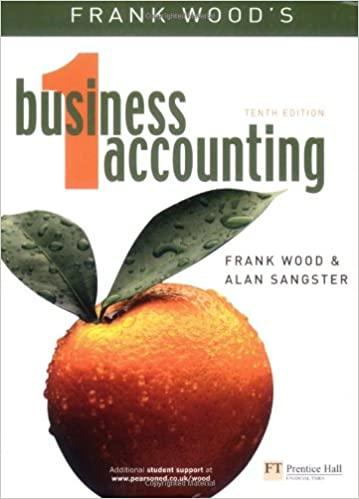The chairman of a public limited company has written his annual report to the shareholders, extracts of
Question:
The chairman of a public limited company has written his annual report to the shareholders, extracts of which are quoted below.
Extract 1
‘In May 20X6, in order to provide a basis for more efficient operations, we acquired PAG Warehousing and Transport Ltd. The agreed valuation of the net tangible assets acquired was £1.4 million. The purchase consideration, £1.7 million, was satisfied by an issue of 6.4 million equity shares, of £0.25 per share, to PAG’s shareholders. These shares do not rank for dividend until 20X7.’
Extract 2
‘As a measure of confidence in our ability to expand operations in 20X7 and 20X8, and to provide the necessary financial base, we issued £0.5 million 8% Redeemable Debenture Stock, 20X1/20X7, 20 million 6% £1 Redeemable Preference Shares and 4 million £1 equity shares. The opportunity was also taken to redeem the whole of the 5 million 11% £1 Redeemable Preference Shares.’
Required:
Answer the following questions on the above extracts.
Extract 1
(a) What does the difference of £0.3 million between the purchase consideration (£1.7m) and the net tangible assets value (£1.4m) represent?
(b) What does the difference of £0.1 million between the purchase consideration (£1.7m) and the nominal value of the equity shares (£1.6m) represent?
(c) What is the meaning of the term ‘equity shares’?
(d) What is the meaning of the phrase ‘do not rank for dividend’?
Extract 2
(e) In the description of the debenture stock issue, what is the significance of
(i) 8%?
(ii) 20X1/20X7?
(f) In the description of the preference share issue, what is the significance of
(i) 6%?
(ii) Redeemable?
(g) What is the most likely explanation for the company to have redeemed existing preference shares but at the same time to have issued others?
(h) What effect will these structural changes have had on the gearing of the company?Authors′ Note
(j) Contrast the accounting treatment, in the company’s profit and loss accounts, of the interest due on the debentures with dividends proposed on the equity shares.
(k) Explain the reasons for the different treatments you have outlined in your answer to ( j ) above.
Step by Step Answer:

Frank Woods Business Accounting Volume 1
ISBN: 9780273681496
10th Edition
Authors: Frank Wood, Alan Sangster





